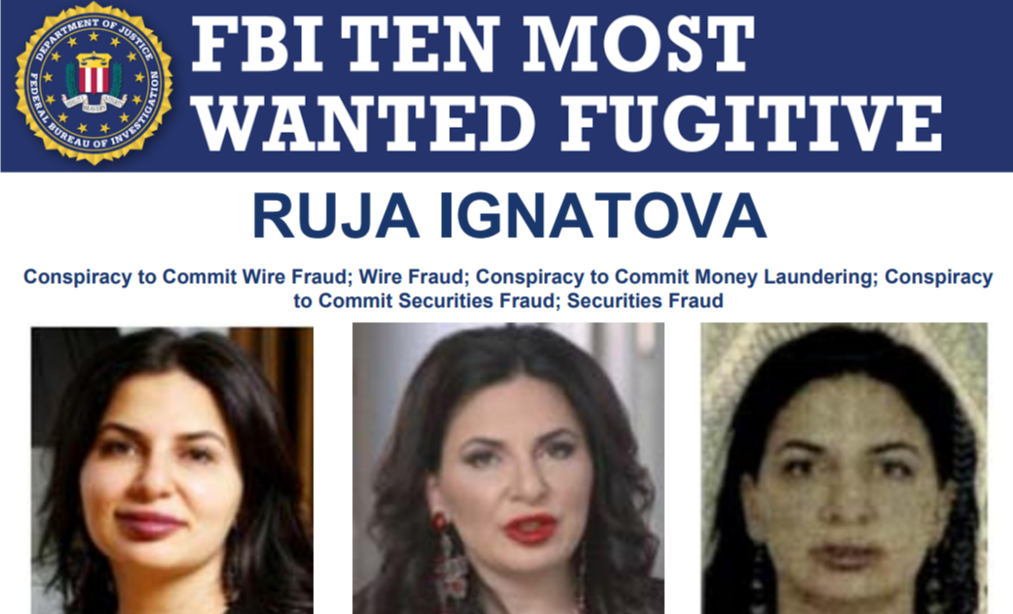FBI puts a $5 million bounty on the missing Cryptoqueen—'We will probably know within a few weeks if it's worked'
"The FBI are now refocusing their efforts on the people around [Ignatova], trying to tempt her close associates to get in touch."

In July 2022 Ruja Ignatova, the self-styled 'Cryptoqueen' behind a pyramid scheme called OneCoin, was placed on the FBI's Top 10 Most Wanted list. The Bulgarian-born Ignatova, accused of defrauding investors of billions, disappeared in 2017: the FBI reckons she travels with "armed guards" and "may have had plastic surgery".
Believe it or not, the plastic surgery may be the least sensational aspect of this story. OneCoin appeared in 2014 and was essentially a multi-level marketing scam with crypto at the core. The exchange was closed in 2017 and, following Ignatova's disappearance, she was subsequently charged with eight crimes in 2019, including wire fraud and securities fraud. The FBI added her to the most wanted list in 2022 with a $100,000 reward, later increasing it to $250,000. Now, it has increased that reward substantially: the question is why.
The reward for information leading to the arrest of Ruja Ignatova now stands at $5 million (£4 million). This follows hot on the heels of a BBC World News documentary, The Case of the Missing Cryptoqueen: Dead or Alive, which revealed Ignatova's links to Bulgarian crime networks, investigated a mafia boss that may be linked to her disappearance, and raised the possibility of Ignatova being murdered.
Nevertheless the FBI's pursuit of Ignatova continues, though increasing the reward twentyfold feels a little like a Hail Mary.
"We are offering a reward up to $5 million for information leading to the arrest and/or conviction of German national Ruja Ignatova, known as 'Cryptoqueen,' for her role in one of the largest global fraud schemes in history," said Matthew Miller of the US State Department.
Jamie Bartlett is the journalist behind the BBC podcast series The Missing Cryptoqueen, a fascinating unpicking of Ignatova's story, and believes the reward is aimed at close associates who may still be protecting her.
"I always felt the initial reward ($100,000, later increased) was a carefully chosen number," writes Bartlett on his Substack. "If Ruja was on the run, she would likely come into contact with various airport officials, harbour staff, chefs working on private yachts, shop assistants. $100,000 would not convince any serious criminals to hand her over—but it might be enough for various service workers who might cross her path.
Keep up to date with the most important stories and the best deals, as picked by the PC Gamer team.
"That, it seems, hasn’t been fruitful. In the last episode of The Missing Cryptoqueen, we examined some of her connections to organized crime groups, and many people believe that if Dr Ruja is still in hiding, it will be with their protection. $100,000 wouldn’t persuade a junior member of a crime syndicate or a personal bodyguard to call the FBI’s hotline—it’s far too risky. But $5 million just might.
"So to me, the increased reward is a sign that the FBI are now refocusing their efforts on the people around Dr Ruja, trying to tempt her close associates to get in touch. We will probably know within a few weeks if it’s worked."
OneCoin was one of those schemes where people earn commissions for getting others to become "investors" and convincing them to encourage family members and friends to do the same—a pretty straightforward pyramid scheme, in other words— and the money lost to the scam is estimated at $4.5 billion. Ignatova was the key factor behind OneCoin's growth: multilingual, highly educated, fabulously dressed, and capable of securing huge investments.
Ignatova is currently the only woman on the FBI's most wanted list. Other figures for which the FBI will offer a $5 million reward include Daniel Kinahan, allegedly the head of one of Europe's largest drug cartels, Semion Mogilevich, a Russian crime boss, and Yulan Adonay Archaga Carias of Honduras' MS-13 criminal gang, also known as "Porky."

Rich is a games journalist with 15 years' experience, beginning his career on Edge magazine before working for a wide range of outlets, including Ars Technica, Eurogamer, GamesRadar+, Gamespot, the Guardian, IGN, the New Statesman, Polygon, and Vice. He was the editor of Kotaku UK, the UK arm of Kotaku, for three years before joining PC Gamer. He is the author of a Brief History of Video Games, a full history of the medium, which the Midwest Book Review described as "[a] must-read for serious minded game historians and curious video game connoisseurs alike."


